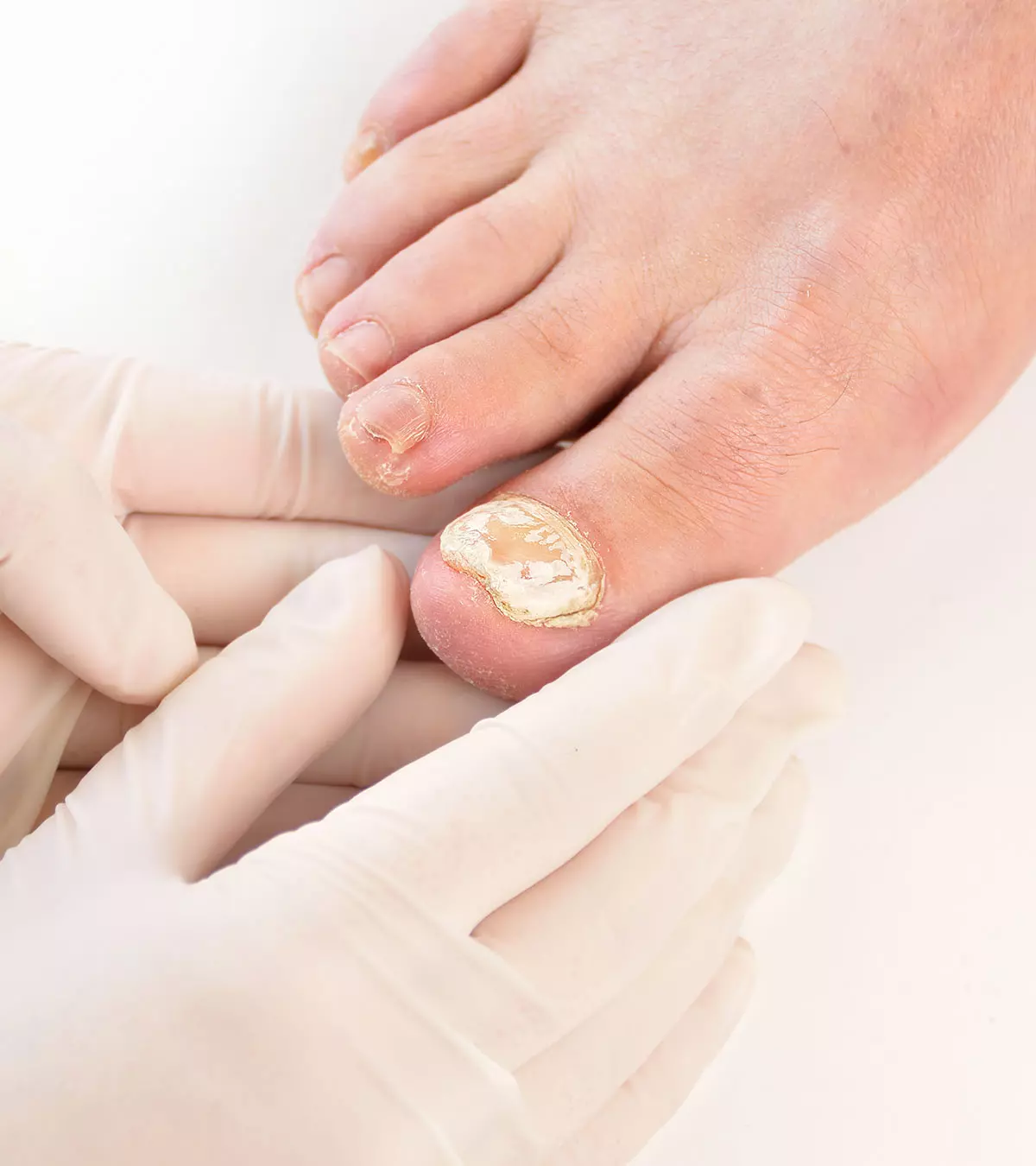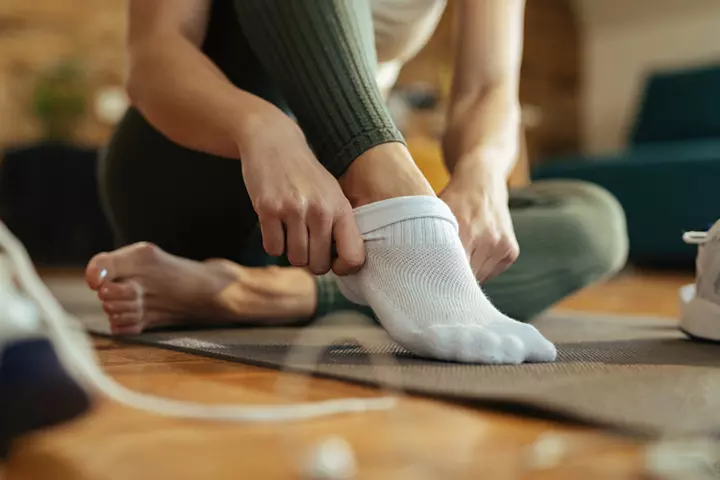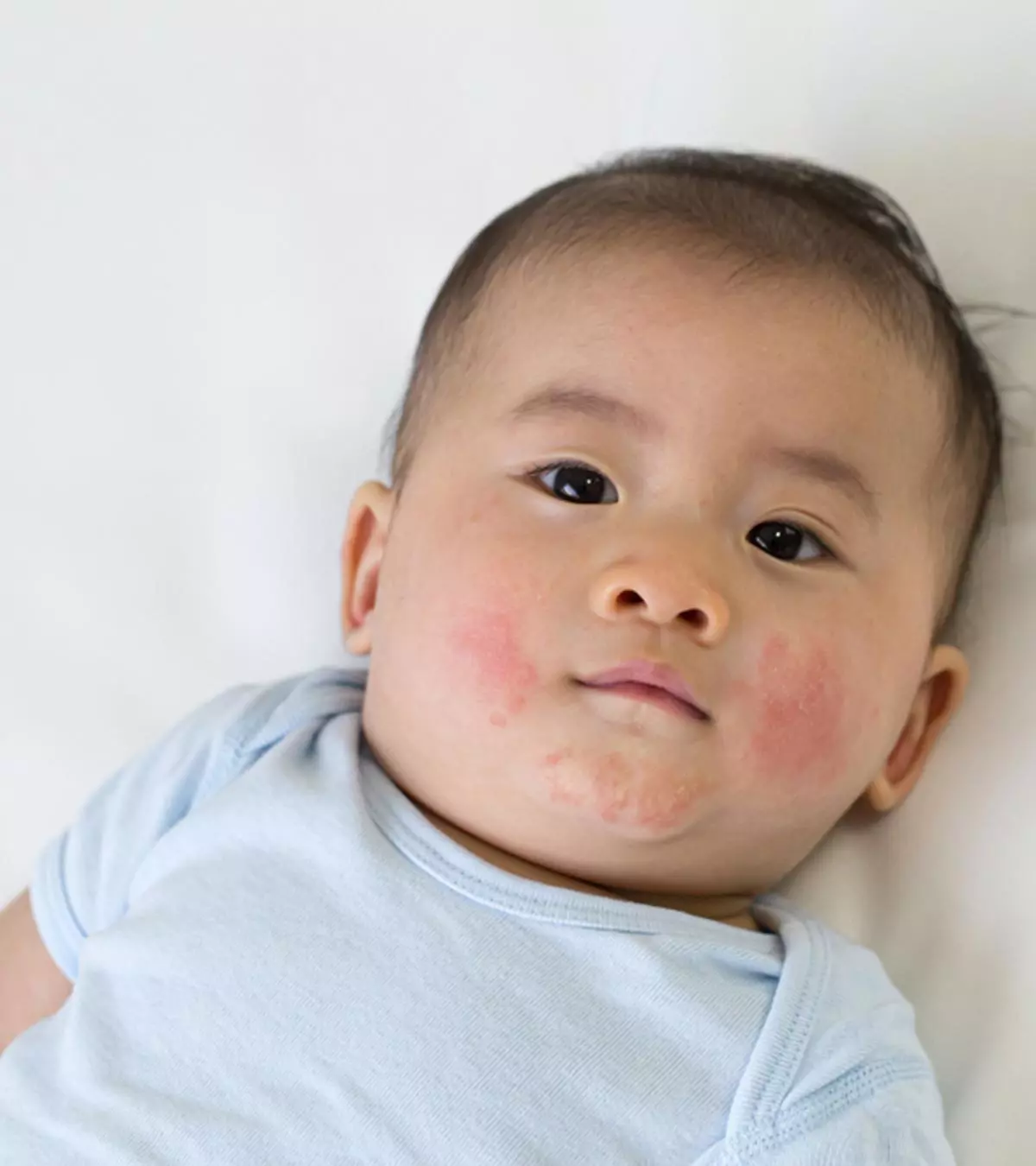
Image: Shutterstock
Onychomycosis or toenail fungus during pregnancy could result in pain and discomfort while walking. Sweaty feet and lack of proper hygiene for feet could cause fungal infections in the toenails. Also, some topical treatments including over-the-counter (OTC) antifungal creams and ointments to treat this condition may not be safe in pregnancy. Hence, it is recommended to seek your doctor’s advice to know the right medications for you.
Topical medications can cure onychomycosis in most women, while a few may require systemic medications.
Read this post to learn more about the causes, symptoms, diagnosis, treatment, and prevention of toenail fungus in pregnancy and how to care for your feet.
Key Pointers
- Toenail infection is caused due to excessive sweating in the feet or improper foot hygiene.
- Nail turning yellow or brown, thick, flaky, or separating from the nail bed, are a few signs of the condition.
- A doctor may suggest topical creams, medicated nail polish, or oral medicines to treat toenail infections.
- Homemade remedies such as tea tree oil and cornmeal may help treat toenail infections.
- The infection may be prevented by practicing proper foot hygiene, wearing open footwear, changing socks regularly, and using separate nail clippers.
How To Know If You Have Toenail Fungus?
According to the Centers for Disease Control and Prevention, fungal nail infections are rampant in the general population, impacting 14% of all people. Hence, it becomes imperative to stay vigilant for any signs, particularly during pregnancy. If you find any of the symptoms below, it might be toenail fungus.
- The nail turns yellow or brown.
- It may become thick and overgrown.
- In some cases, the nail might turn white and become soft, dry, and powdery.
- When left untreated, foul-smelling debris may accumulate under the feet.
- Ultimately, the nail might fall off or cause discomfort and pain
 Be watchful
Be watchfulCauses For Toenail Fungal Infections During Pregnancy

Image: Shutterstock
Around 85-90% of fungal nail infections are caused by fungal organisms such as Trichophyton rubrum and Trichophyton mentagrophytes. These are highly resistant dermatophytes and can survive in damp or moist environments (1).
According to a research paper published in the Harvard Health Publishings, the following risk factors may make your toenails more susceptible to fungal infections (2).
- Wearing tight-fitting shoes and hosiery.
- Poor foot hygiene
- Covering the nail with multiple layers of nail polish
- Conditions such as diabetes mellitus
 Quick fact
Quick factIs Toenail Fungus Treatable During Pregnancy?
According to the Global Nail Fungus Organization, when detected in the early stages, fungal toenail infections can be cured (3)
. Your treatment plan will depend on the infection’s severity and overall health. Always consult your healthcare provider to determine the best course of action.
Safe Treatment Options For Toenail Fungus During Pregnancy
The treatment options for nail fungal infections can be divided into three categories.
- Topical antifungal medications
- Oral antifungal medications
- Home remedies
Most of these medications are available over-the-counter. However, go by your doctor’s recommendation to avoid any pregnancy complications.
1. Topical antifungal medications

Image: IStock
- Creams: Imidazoles, clotrimazole, itraconazole, and miconazole are considered safe for topical therapy for fungal skin infections during pregnancy (4) (5). These creams could be purchased over-the-counter but it is not advisable to self-medicate, especially when pregnant. Consult your doctor, obstetrician or podiatrist for the right diagnosis and appropriate medicine.
- Nail polishes: These may be tried during the initial stages of the infection. The affected nail is removed as much as possible before applying the nail polish. Penlac is one such brand of nail polish you may use. The USFDA has categorized this drug under “Pregnancy Category B,” which means animal studies have not shown any risk to the fetus, and there are no adequate studies on pregnant women So, your doctor might prescribe this medication when the benefits outweigh the risks (6).
2. Oral antifungal medications
The use of oral antifungal agents should be limited during pregnancy, as they may affect the fetus
. Research suggests that some oral medications for fungal infections could increase the risk of fetus malformations (7). But there is no conclusive evidence on it. So, your doctor may weigh the benefits and risks of oral fungal medications before prescribing them to you. Self-medicating with antifungal medicines during pregnancy is not advised (8).
3. Natural remedies
Here are a few natural remedies that have been in use but not all of them may be having conclusive scientific evidence.
- Tea tree oil: According to a randomized study, tea tree oil might be helpful in treating onychomycosis (9). The US National Association for Holistic Aromatherapy suggests that it may be safe to use properly diluted tea tree oil in pregnancy (10).

Image: IStock
- Vicks VapoRub: According to a study published in the Journal Of The American Board Of Family Medicine, 15 out of 18 participants displayed a positive effect with the use of Vicks VapoRub for onychomycosis, and hence could be an option for treating toenail fungus (11).
- Cornmeal: Cornmeal has anti-fungal and anti-inflammatory properties. In a tumbler, add one cup of cornmeal and two cups of warm water. Soak your legs in it for 15minutes. This home remedy is useful and safe too
While natural remedies such as tea tree oil and Vicks VapoRub can provide relief, they should be used with caution during pregnancy. Always consult your healthcare provider before trying any home remedy to ensure it is safe for you.
What Happens If Toenail Fungus Is Left Untreated?
Early signs of toenail fungal infections (scattering white spots across the nail) are subtle and often go unnoticed
. But, with time, the nails could display the following conditions:
- Nails could become thicker than usual, thus making them difficult to cut.
- Nail appearance changes, where you will see yellow-brown stains on the nails. White, green, and black flecks or flakes might appear.
- The nails may give out a foul smell.
- One could feel pain and numbness at the nailbed.
If left untreated, the infection can spread to other nails as well. Severe cases may cause the entire nail to separate from the nailbed, thus causing pain and discomfort while walking (12).
How To Prevent Fungal Nail Infections Naturally During Pregnancy?

Image: Shutterstock
Here are a few natural prevention measures for fungal nail infections.
- Practice proper foot hygiene and toe care by regularly washing them with soap and drying them thoroughly at least once a day.
- While showering in public showers, wear rubber shoes, flip flops, or shower clogs.
- Choose shoes that fit properly, with enough space around the toes.
- Limit exposure to moist environments by avoiding wet socks and shoes, which can promote fungal growth.
- Make sure there is proper air circulation within your footwear.
- Choose socks that are made from cotton material.
- If your feet sweat excessively, then change your socks every day and wash them regularly.

Image: IStock
- Avoid sharing nail clippers with others and maintain proper nail health.
- If your feet tend to be wet, consider using dry powders that can help keep your feet dry (13).
 Point to consider
Point to considerThese precautions may help reduce the risk of fungal infection. If you notice any abnormal changes in your nails, then consult your doctor to avoid any potential health risks.
Frequently Asked Questions
1. Can toenail fungus affect my pregnancy?
Toenail fungus is normally a mild infection, and there is no evidence that it can affect your baby. However, delay in treatment or diagnosis can cause the infection to spread to the other toes and fingers. A widespread fungal infection could require extensive medication, which may not be favorable during pregnancy. Therefore, get any signs of fungal infection checked by a doctor.
2. Can toenail fungus harm my unborn baby?
There is no evidence that toenail fungus could cause harm to the fetus.
If the infection requires surgery, your doctor might ask you to wait until the end of your pregnancy (7).
3. How do I know if my toenail fungus is dying?
Some signs that may indicate that toenail fungus is dying include decreased nail thickness and nail returning to its original color. You will also experience reduced pain and discomfort and observe the growth of a fresh and healthy nail from the base of the nail bed (15):
4. Is laser toenail fungus treatment safe during pregnancy?
Yes. Using laser treatment for toenail fungus is considered safe during pregnancy and breastfeeding (16).
Toenail fungus during pregnancy may cause an infection that discolors nails, making them thick and foul-smelling. In addition, ill-fitting shoes, poor nail hygiene, and conditions such as diabetes make one more prone to fungal infections. Onychomycosis or toenail fungus causes pain and discomfort and may be treated with topical or oral antifungal medications. However, you should refrain from using any OTC medication without consulting a doctor. Home remedies such as tea tree oil, Vicks Vaporub, and cornmeal may be used for treating mild cases.
Infographic: Toenail Fungus During Pregnancy – Symptoms And Causes
Pregnant women may develop toenail fungus or onychomycosis due to various factors, including unhygienic conditions. Therefore, it is important to identify the infection during pregnancy to provide timely treatment. So, check out the infographic below to explore identifiable symptoms and possible causes of toenail fungus during pregnancy. Illustration: Momjunction Design Team
Learn effective methods to combat fungal nail infections using straightforward techniques. Eliminate tinea unguium and onychomycosis by following simple guidelines provided for your convenience.
References
1. Anisha Soni, and Win Leung Siu; How to treat fungal nail effectively; The Pharmaceutical Journal
2. Toenail Fungus (Onychomycosis); Harvard Health Publishing
3. Most Effective Nail Fungus Treatment During Pregnancy; Global Nail Fungus Organization
4. King CT et al., Antifungal therapy during pregnancy; NCBI (1998)
5. Smitha S Prabhu and Pragathi Sankineni, Managing dermatophytoses in pregnancy, lactation, and children; Clinical Dermatology Review
6. Approved Label- Penlac; US Food and Drug Administration
7. Moudgal VV and Sobel JD, Antifungal drugs in pregnancy: a review; NCBI(2003)
8. Benoit Pilmis et al., Antifungal drugs during pregnancy: an updated review; Journal of Antimicrobial Chemotherapy
9. Dina AbdelHamid et al., Evaluation of the Therapeutic Efficacy of Tea Tree Oil in the Treatment of Onychomycosis; International Journal of Pharmacognosy and Phytochemical Research
10. Safety of Essential Oils During Pregnancy; National Association for Holistic Aromatherapy
11. Richard Derby et al., Novel Treatment of Onychomycosis using Over-the-Counter Mentholated Ointment: A Clinical Case Series; Journal Of The American Board Of Family Medicine
12. Toenail Problems; Harvard Health Publishing
13. Bharat Parashar et al., Natural Therapy of Fungal Nail Disease: Review; The Pharma Innovation
14. Ringworm and Fungal Nail Infections Basics; CDC
15. How Can I Tell If My Fungal Toenail Is Healing; AFACC
16. Jose W Ricardo and Shari R Lipner; Safety of current therapies for onychomycosis; NCBI (2020)
Community Experiences
Join the conversation and become a part of our nurturing community! Share your stories, experiences, and insights to connect with fellow parents.
Read full bio of Dr. Umera Zakiahmed Saiyed
Read full bio of Rebecca Malachi
Read full bio of Swati Patwal
Read full bio of Aneesha Amonz





















